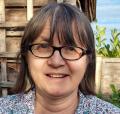
Baby massage sessions specifically for premature newborns are proving a hit with parents at Colchester Hospital.

One mum, Kerry Rowley, attended the course with her baby, Olivia, who's now three months old. She was born four weeks early and spent nine days on the Neonatal Unit.
Kerry said: "Olivia found it really relaxing. It's something I'd definitely do again. There are people here that were on the unit at the same time as us, so it's nice to get out and see people you recognise."

Mum-of-four Amy Schearman said she found the sessions "really helpful" after her baby Esme was born six weeks early.
She said: "It helps with bonding. Her being premature was traumatic and you don't really get the firsts like other mothers do.

"She's my first premature baby out of four and when you are with other premature babies it's helpful to know the milestones not reached is quite normal."
The aim of the five-week course, held in the hospital's Iceni Centre, is to promote health and at the same time teach baby massage techniques to help relax and calm newborns.
This can potentially also reduce associated mental health concerns in parents, which have been found to be linked with neonatal unit admissions.
The sessions offer support to parents and are helping to provide special bonding time.
Julia Michael, a nursery nurse at the neonatal unit, is running the sessions. She said: "These parents may have a future of frequent hospital visits, so it's important to provide a positive side to their experience of the hospital.
"It's also a chance for parents to share their experiences and support each other after what, for some of them, has been a traumatic time."
She added that it is hoped the sessions will continue. "We hope we can offer it more as after care, as I think it's really important to bridge the bonding interruption."



Comments: Our rules
We want our comments to be a lively and valuable part of our community - a place where readers can debate and engage with the most important local issues. The ability to comment on our stories is a privilege, not a right, however, and that privilege may be withdrawn if it is abused or misused.
Please report any comments that break our rules.
Read the rules here